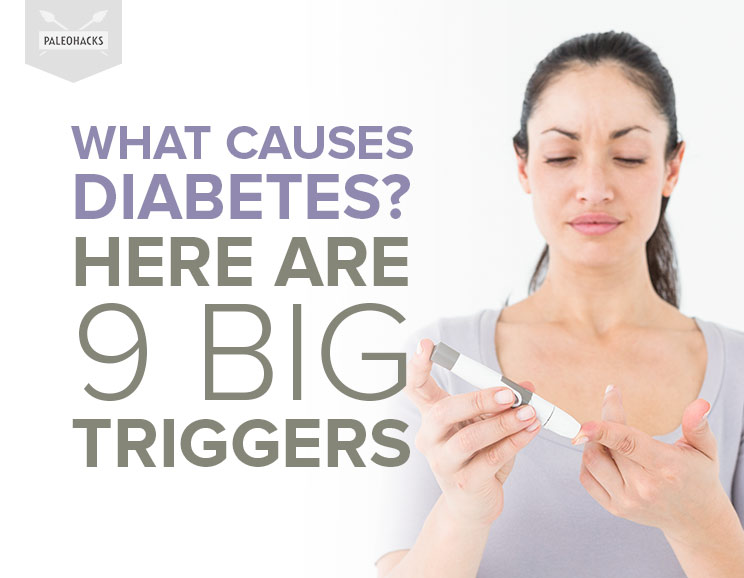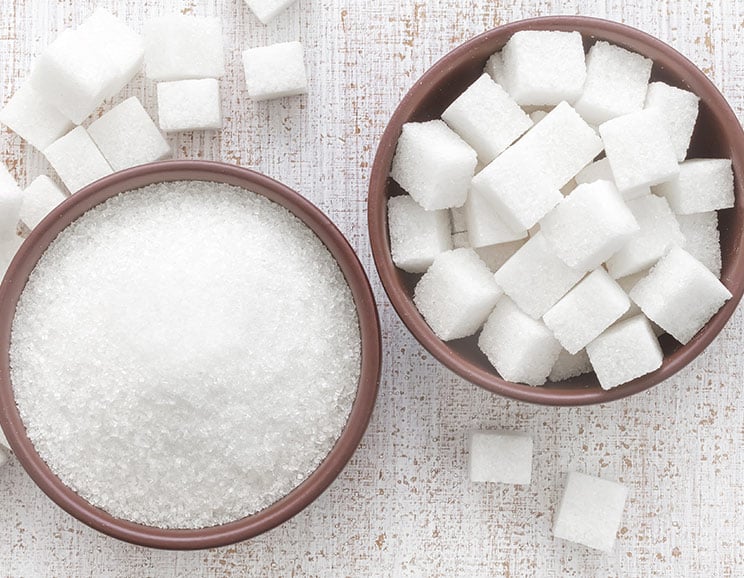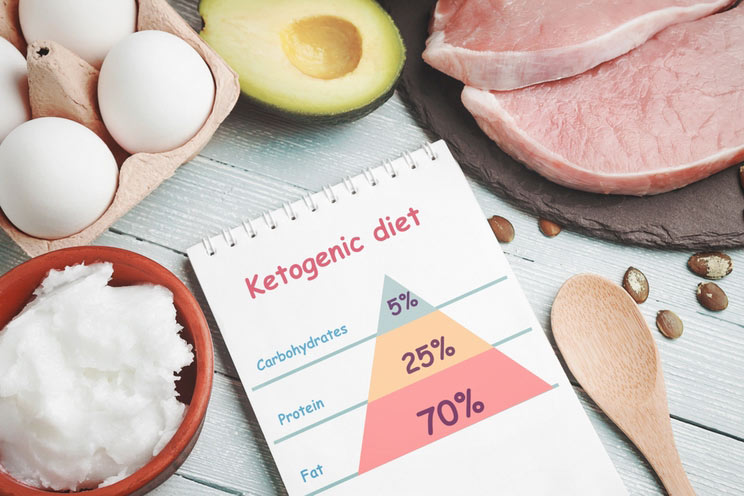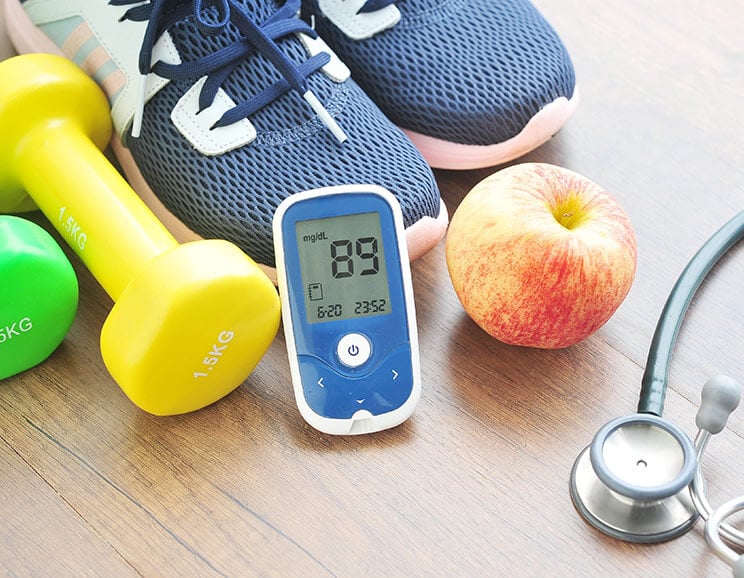Most people know that eating too many desserts and sweet treats can trigger “the sugar”, but it’s not the only risk factor. Here’s what causes diabetes, and the best ways to avoid your worst triggers.
Diabetes is on the rise. It is estimated that 108 million people had diabetes in 1980; now, that number is closer to 422 million. (1)
If you’re having blood sugar issues, or are simply concerned as to what could be causing so many cases of type two diabetes, it helps to know the triggers. Some of the reasoning behind what causes diabetes might surprise you!
Suffering from Diabetes or blood sugar imbalance?
Grab our FREE Diabetes Guide & 7 Day Meal Plan here!
What Exactly Is Diabetes?
Essentially, diabetes is a disease where your body can no longer regulate your blood sugar levels effectively.
When our bodies are functioning normally, our pancreas releases the hormone insulin in response to consuming carbohydrates. Insulin helps keep our blood sugar stable by shuttling glucose into our cells to be used for energy and storing the excess as fat. This process effectively removes glucose from our bloodstream before it can cause damage.
However, in the case of diabetes, this system goes awry. Your cells become resistant to the effects of insulin, essentially refusing to let insulin shuttle glucose inside – so your blood sugar ends up constantly elevated.
There are two types of diabetes: Type 1 diabetes is mostly genetic, while Type 2 diabetes occurs as a result of poor diet and lifestyle choices.
Nine Diabetes Triggers
If you’re curious about what causes diabetes, the truth is that there are numerous lifestyle and environmental factors that you probably wouldn’t expect.
Here are nine common diabetes triggers to avoid, so you can keep your risk of developing type 2 diabetes as low as possible.
1. Too Much Sugar

Sugar is the most common trigger for diabetes – and the most well-known. One study shows that drinking just one sugar-sweetened beverage per day increases your diabetes risk by 13%! (4) Unsurprisingly, countries where sugar consumption is highest also have the highest rates of type 2 diabetes, while those with the lowest consumption have the lowest rates. (5)
But what exactly constitutes “sugar”? Most of us think of candies and other sweets, but really, anything containing glucose or carbohydrates is dangerous. Simple carbohydrates are broken down in our bodies in the exact same way as other sugar molecules, leading to rapid blood sugar spikes.
When your blood sugar is raised constantly, it can overwork your pancreas. Eventually, cells become less responsive to the constant sugar spikes, and insulin resistance sets in.
Steer clear of processed carbohydrates like breads, pasta, cookies, cakes, and soda. These foods have been stripped of their natural fibers, which we need in our diet to help temper our blood sugar spikes.
Fortunately, natural sugars like honey and maple syrup don’t seem to trigger diabetes. This is because they contain enzymes, nutrients, and fibers that reduce blood sugar spikes.
2. Not Exercising
Studies show that people who are physically active have a lower risk of developing type 2 diabetes.
Researchers believe this is because exercising has beneficial effects on your glucose metabolism. Movement helps prevent insulin resistance by making your cells more efficient at burning glucose.
Regular exercise can also help regulate blood sugar by using excess glucose in your blood for energy, rather than storing it as fat. This is a separate benefit in and of itself, since excess fat and obesity are also a risk factor in developing diabetes. (6)
3. Obesity
If you’re overweight, you’re automatically at a higher risk of developing diabetes.
As we learned earlier, glucose that isn’t used for energy is stored as body fat. Obesity is a sign that this is happening often, meaning that your pancreas may already be working overtime to produce enough insulin to manage your excess sugar consumption.
Obesity also causes widespread inflammation, which is also linked to the development of diabetes. (7)
4. Stress

Interestingly, chronic stress can also be a potential diabetes trigger. When you’re stressed, your body sends out a flood of hormones to initiate your fight-or-flight response. This process automatically raises your blood sugar levels so that your body has the energy it needs to combat danger.
Consistently elevated insulin levels can lead to insulin resistance. It can also overwork your pancreas. Either way, spending too much time feeling stressed out can ultimately lead to diabetes. (8)
5. Certain Medications
Some prescription medications can trigger diabetes by impairing the ability of your pancreatic cells to effectively produce insulin.
Below is a short list of some types of medications that may have this effect – but it is not comprehensive. Consult with your doctor to see if any of the medications you’re taking might unknowingly increase your risk of diabetes. (9)
- Anti-seizure drugs
- Psychiatric drugs
- HIV drugs
- Pentamidine, a drug that treats pneumonia
- Glucocorticoids used to treat inflammatory diseases
- Anti-rejection medicines for transplant patients
- Statins
6. Chemicals
Chemicals you come into contact with on a daily basis can also trigger diabetes. For instance, studies show Bisphenol-A (BPA), a chemical found in plastic containers and can linings, is a risk factor. This is because it acts directly on pancreatic cells and insulin to produce an insulin-resistant state. (10)
Certain pesticides are linked to increased incidence of diabetes, so be sure to scrub your veggies carefully – or buy organic. (11)
Finally, chemicals like phthalates, cadmium, and mercury can also increase your risk of developing type 2 diabetes. (12, 13, 14)
To avoid unnecessary chemicals, swap out plastic containers with glass, and switch to natural shampoos, cosmetics, and household cleaners (or even make your own!).
7. Thyroid Diseases

It’s true – thyroid disorders and diabetes often go hand in hand. This is because they both influence, and are influenced by, hormones that regulate blood sugar control. In fact, some thyroid hormones even contribute directly to pancreatic function and sugar metabolism.
Studies show that people with diabetes have a higher prevalence of thyroid disorders as well – and the reverse is also true. (15)
8. Viruses
While this may seem like an odd one, some research finds that a class of viruses called enteroviruses may actually trigger the more rare type 1 diabetes. (16)
Enteroviruses include the rotavirus, mumps, and cytomegalovirus. If type 1 diabetes runs in your family and you believe you may have been exposed to these viruses, keep this in mind and talk to your doctor.
9. Genetics
We know that genetics plays a big role in type 1 diabetes, but it may also increase your risk of type 2 as well.
However, even if you’re genetically predisposed to developing diabetes, it doesn’t mean that you will. Lifestyle factors make a huge difference, and if you’re careful not to eat too much sugar, keep your stress levels down and exercise often, there’s a good chance you can avoid that dreaded diagnosis. (17)
The Bottom Line
If you’ve wondered about what causes diabetes, the answer is that there are quite a few different triggers. While you can’t fight your own genetics, the best thing you can do is eat a sugar-free diet, avoid chemicals and pesticides, get plenty of exercise, and find effective ways to manage your stress.
Now that you know what causes diabetes, you might be concerned about your thyroid. Keep your diet in tip-top shape with our 100 Thyroid Friendly Recipes cookbook, developed by clinical nutritionist Kinsey Jackson. Get the nutrients you need to support your thyroid today!



 Keto Avocado Chips (Just 4 Ingredients!)
Keto Avocado Chips (Just 4 Ingredients!)









Show Comments